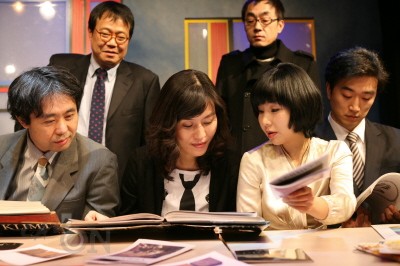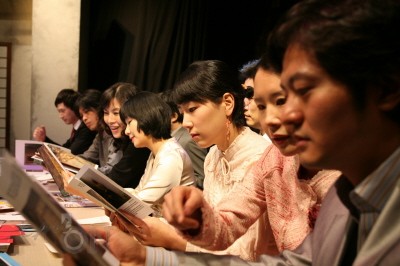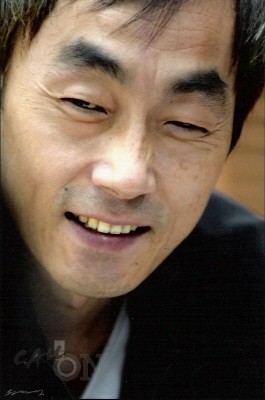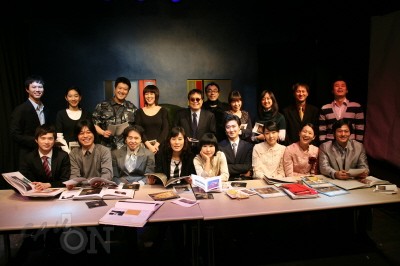
The play is alive. It is different from the movie which shows the copied films often and often. The play in the small theater is much live. Especially plays like ‘Seoul Note’, which tells the story of our ordinary world gives us a big chance of spiritual participation. At the first performance day of ‘Seoul Note’, not only the players but also the audience, jumped onto the small stage. Not only the stage but the seats, changed to the art gallery which was a background of the play.
“The fox in ‘the Little Prince’ said that which is truly precious is not visible to the eye. We need to see by the heart. By the way, I think that if we see with just a ‘heart’, we cannot see anything. How can we see by the heart? Heart… is different from person to person. So we cannot know.”
It is one of the last scene’s lines. There were a lot of similar lines spoken by the players but I think this one is most important. (Choosing one specific line as most important or something is not appropriate to this play because it has no main, special flow. The play writer may be reluctant to do it.) But all subtle changes and troubles looked like facing that line. Its meaning seemed to represent the cause of the characters’ separate conversations. You’ll understand after watching it.
When the audience entered the theater, an actor was reading on stage as if the play had already started. Without any change of lighting, the play began in that way. In 2014, World War III has started. With many sought-refuge European pictures, several groups of people gathered in an art gallery(as an everyday affair). However as the play flows, each of them get more serious little by little. The reasons they have trouble was not particularly special. The problems include family members, differences of interest, gain and loss, life and death, passed love, and all manner of things that we normally do in the passing of life. The surface was quiet but inside was… not silent at all, full of calm shouting.
As the director said, there was no favorite or unpleasant character. All of them were favorable and unpleasant at the same time. They looked so familiar but sometimes they did not seem pleasant in their actions; taking photos repeatedly, watching pictures for too long a time, exchanging meaningless conversations, and recurring miscommunication… But if insist consequently, the characters provided a feeling of compassion rather than feelings of distance, probably, because they represent ourselves. We make own happiness and discomfort. And therefore the director might say this play makes ourselves look back. On one hand, we feel sad and not happy, but on the other hand, the audience feels comfortable.

The original source of the play ‘Seoul Note’ is ‘Tokyo Note’ written by Oriza Hirata. And the original source of ‘Tokyo Note’ is ‘Tokyo Story’ written by Ozu Yasziro. The theme of ‘Tokyo Story’ is about ‘what is the distance and time that connect or withdraw our emotions among family members?’ Oriza Hirata enlarged the theme from family to modern people. The family of ‘Tokyo Story’ became just one part in ‘Tokyo Note’. There were many various other characters in the play. So the title changed from ‘Story’ to ‘Note’. (How note is different from story? I leave it to your judgment.)
The principal flow of Japanese modern play, ‘Quiet Play’, is represented in ‘Tokyo Note’, too. Quiet Play focuses on our being sensitive about daily life, and mental state of a modern person. Instead of seeking exciting and sensational plays, people have started to be interested in familiar that focus on the everyday, ones that people rarely get sick and tired of.
‘Seoul Note’ adapted by director Park Kwang-jung follows almost all factors of ‘Tokyo Note’; synchronizing lines, with actor’s back to the audience, no twists or turns of plot and conclusion, recurring small episodes, etc. The atmosphere created in Quiet Play still exists of course. Most of all, there is no huge argument, so are present us. One’s own life is more important than that of others. Participating and interrupting is annoying. It is different from egoism, closer to individualism. So everyone get comfortable but one way they are lonely…
Nevertheless, ‘Seoul Note’ is quite sentimental. There is background music, which did not exist in the original version. The distance among characters is also not too much far. The audience feels a quiet lyricism rather than coolness. This point might make a ‘Seoul Note’ warm-hearted play anyway.
“We are still brother and sister.” “Even if we watch the universe by a telescope, it is not the universe watching us.” “That is absolutely… there would also be another me, looking back who gazing at the sea.” “When I needed to father was my childhood, to me…” “To love is participation, sharing with…” and “It used to be getting beautiful, the memory of the past.”
Are you available to guess the play by these lines? Well, it is never easy. You might go to the small theater and feel it with your own emotions. It will be your big chance to seek hidden jewels inside of you.

Preparing the first performance just before ahead, the small theater was filled with passion of actors. In this passionate atmosphere, CAH met the director Park Kwang-jung, whose acting on television is also familiar to us.
Q. When adapting ‘Seoul Note’ from ‘Tokyo Note’, what points do you pay careful attention to?
A. Basically, the background was moved from Tokyo to Seoul. I had to penetrate into the situation of Tokyo, the original background. It was not easy. Some people say the Japanese pay peculiar and careful concern is not proper to Koreans. However, do not forget the background is not modern times. It is the year 2014, the future. World War III has started and Korea is unified. Seeing this play in a contemporary sight or perspective is inappropriate.
Q. On your mini-homepage, you said ‘Seoul Note’ is ‘the play which is getting to like each time to perform’. Is there any special reason ‘Park Theater Company’ performs ‘Seoul Note’ annually?
A. Yes, except last year, we have played ‘Seoul Note’ every year. The reason is similar to the reasons Shakespeare and Chekhov’s plays are always opening somewhere. The difference is the era; both are famous plays but ‘Seoul Note’ has only been around 15 years. Well, it is really getting newer every time I direct. We are learning just as we would as a student because it is such a wonderful play.
Q. What is special to the version of ‘2008 Seoul Note’?
A. The play becomes different according to ‘who’ would be the casts of characters; the color of the play or something. On that point, this year’s Seoul Note is very new. We did auditions and we have almost an entirely new cast of actors and actresses, who made it. Absolutely, the atmosphere of the play will change a little or a lot.
Q. What is your favorite scene or line?
A. ‘Seoul Note’ is a quite different play. It has no special main story or one hero or heroin. The play itself and its 17 characters are all hero and heroin. Every character gives food for thought. Therefore, I like every scene from start to end and every cast member in the play.
Q. If you could summaries ‘Seoul Note’ into one sentence, what would it be?
A. It is the play which makes ourselves(present each individual) look back.

TIP
TITLE | Seoul Note (original title: Tokyo Note)
ADAPTER, DIRECTOR | Park Kwang-jung
DATE | 08.03.14(Fri) ~ 08.05.12(Mon)
TIME | Weekdays(8:00), Sat & Holidays(4:00, 7:30), Sun(4:00), except Monday
PLACE | Jeong-bo small theater, in Dae Hak No
PRICE | 20,000
PRODUCE | Park Theater Company (www.parktc.com)

